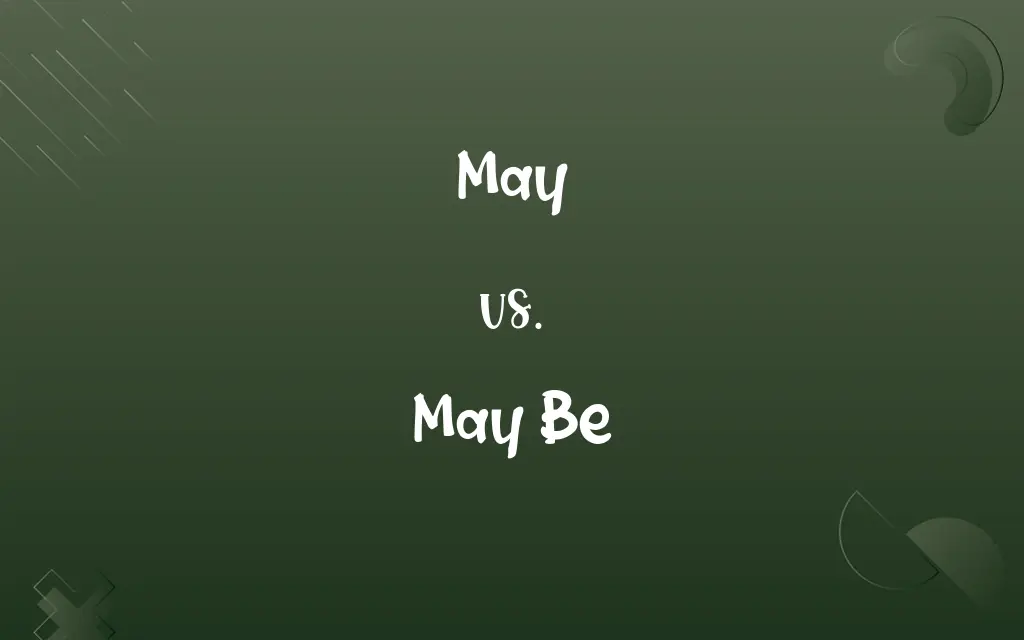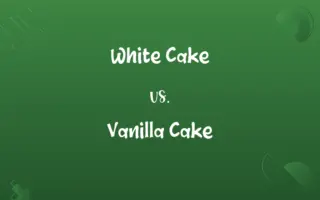May vs. May Be: Know the Difference

By Shumaila Saeed || Updated on December 25, 2023
"May" expresses possibility or permission, while "May be" suggests uncertainty or speculation.

Key Differences
"May" is a modal verb used to indicate possibility or to ask or give permission. "May be" is a combination of the modal verb "may" and the verb "be," used to express a possibility or uncertainty about a state or condition.
Shumaila Saeed
Dec 17, 2023
"May" often introduces a polite request or grants permission, as in "May I leave early?" In contrast, "May be" is used to speculate about something that could be true, for instance, "It may be raining outside."
Shumaila Saeed
Dec 17, 2023
In terms of grammatical structure, "May" precedes a base verb to form a phrase, like "may go" or "may have." On the other hand, "May be" is already a complete verb phrase, with "may" modifying the state of being indicated by "be."
Shumaila Saeed
Dec 17, 2023
"May" is versatile, used in both formal and informal contexts. In comparison, "May be" often appears in conversations where uncertainty or conjecture is being expressed about a situation or fact.
Shumaila Saeed
Dec 17, 2023
"May" can also express a wish or hope, as in "May you have a good journey." However, "may be" doesn't have this function and is strictly used to convey the possibility of something being true, such as in "She may be the best candidate for the job."
Shumaila Saeed
Dec 17, 2023
ADVERTISEMENT
Comparison Chart
Usage
Modal verb for possibility or permission
Phrase indicating uncertainty or speculation
Shumaila Saeed
Dec 17, 2023
Context
Formal and informal requests or permissions
Speculation or uncertainty about a fact
Shumaila Saeed
Dec 17, 2023
Expressiveness
Can express wishes or hopes
Strictly for potential truths or states
Shumaila Saeed
Dec 17, 2023
ADVERTISEMENT
May and May Be Definitions
ADVERTISEMENT
May
The fifth month of the year in the Gregorian calendar. See Table at calendar.
Shumaila Saeed
Dec 10, 2023
May
To have permission to, be allowed. Used in granting permission and in questions to make polite requests.
You may smoke outside;
May I sit there?
Shumaila Saeed
Dec 10, 2023
May
Expressing a present possibility; possibly.
He may be lying;
Schrödinger's cat may or may not be in the box
Shumaila Saeed
Dec 10, 2023
May
Expressing a wish (with present subjunctive effect).
May you win;
May the weather be sunny
Shumaila Saeed
Dec 10, 2023
May
Used in modesty, courtesy, or concession, or to soften a question or remark.
Shumaila Saeed
Dec 10, 2023
May
An auxiliary verb qualifying the meaning of another verb,
How may a man, said he, with idle speech,Be won to spoil the castle of his health!
For what he [the king] may do is of two kinds; what he may do as just, and what he may do as possible.
For of all sad words of tongue or penThe saddest are these: "It might have been."
Shumaila Saeed
Dec 10, 2023
May
Contingency or liability; possibility or probability.
Though what he learns he speaks, and may advanceSome general maxims, or be right by chance.
Shumaila Saeed
Dec 10, 2023
May
Modesty, courtesy, or concession, or a desire to soften a question or remark.
How old may Phillis be, you ask.
Shumaila Saeed
Dec 10, 2023
May
The early part or springtime of life.
His May of youth, and bloom of lustihood.
Shumaila Saeed
Dec 10, 2023
May
The flowers of the hawthorn; - so called from their time of blossoming; also, the hawthorn.
The palm and may make country houses gay.
Plumes that mocked the may.
Shumaila Saeed
Dec 10, 2023
May
Thorny Eurasian shrub of small tree having dense clusters of white to scarlet flowers followed by deep red berries; established as an escape in eastern North America
Shumaila Saeed
Dec 10, 2023
Repeatedly Asked Queries
Is "May" a modal verb?
Yes, "May" is a modal verb used for possibility or permission.
Shumaila Saeed
Dec 17, 2023
Is "May be" used for giving permission?
No, "May be" is used for expressing uncertainty, not for giving permission.
Shumaila Saeed
Dec 17, 2023
Can "May" be used in formal requests?
Yes, "May" is suitable for formal requests, like "May I speak with you?"
Shumaila Saeed
Dec 17, 2023
Can "May" express a wish?
Yes, "May" can express a wish, like "May you be happy."
Shumaila Saeed
Dec 17, 2023
Is "May" used in past tense?
No, "May" is not used in the past tense; "might" is often used instead.
Shumaila Saeed
Dec 17, 2023
Can "May" indicate likelihood?
Yes, "May" can indicate likelihood or probability.
Shumaila Saeed
Dec 17, 2023
In what context is "May be" used?
"May be" is used in contexts where there is uncertainty or speculation.
Shumaila Saeed
Dec 17, 2023
Can "May be" stand alone in a sentence?
"May be" can stand alone in response to a question or speculation.
Shumaila Saeed
Dec 17, 2023
Is "May be" a complete verb phrase?
Yes, "May be" is a complete verb phrase indicating speculation.
Shumaila Saeed
Dec 17, 2023
Can "May" grant permission?
Yes, "May" can be used to grant permission, like "You may leave now."
Shumaila Saeed
Dec 17, 2023
Can "May" be replaced with "might"?
Yes, "May" can often be replaced with "might," although "might" implies less certainty.
Shumaila Saeed
Dec 17, 2023
Is "May be" used for factual statements?
No, "May be" is not used for facts but for uncertain possibilities.
Shumaila Saeed
Dec 17, 2023
Is "May be" appropriate for formal writing?
"May be" can be used in formal writing, but it's more common in informal speech.
Shumaila Saeed
Dec 17, 2023
Is "May be" used in questions?
"May be" is rarely used in questions; it's more common in statements.
Shumaila Saeed
Dec 17, 2023
Can "May" indicate a wish for the future?
Yes, "May" can express hopes or wishes for the future.
Shumaila Saeed
Dec 17, 2023
Can "May" be used in negative form?
Yes, "May" can be used in negative form, like "You may not enter."
Shumaila Saeed
Dec 17, 2023
Is "May be" equivalent to "might be"?
"May be" and "might be" are similar, but "might be" often suggests a lower probability.
Shumaila Saeed
Dec 17, 2023
Does "May be" have a past tense form?
No, "May be" does not change in past tense; context indicates time.
Shumaila Saeed
Dec 17, 2023
Can "May" be polite in requests?
Yes, "May" is often used for politeness in requests.
Shumaila Saeed
Dec 17, 2023
Does "May" always require a following verb?
Yes, "May" requires a base verb to form a complete verb phrase.
Shumaila Saeed
Dec 17, 2023
Share this page
Link for your blog / website
HTML
Link to share via messenger
About Author
Written by
Shumaila SaeedShumaila Saeed, an expert content creator with 6 years of experience, specializes in distilling complex topics into easily digestible comparisons, shining a light on the nuances that both inform and educate readers with clarity and accuracy.









































































